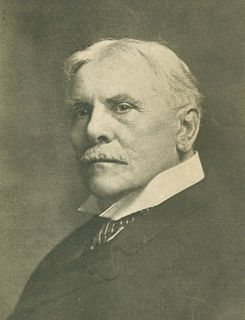A Quote by J. C. Ryle
I fear it is sometimes forgotten that God has married together justification and sanctification. They are distinct and different things, beyond question, but one is never found without the other. All justified people are sanctified, and all sanctified people are justified. ... Tell me not of your justification, unless you have also some marks of sanctification. Boast not of Christ's work for you, unless you can show us the Spirit's work in you.
Related Quotes
Justification and sanctification are both God's work, and while they can and must be distinguished, the Bible won't let us separate them. Both are gifts of our union with Christ, and within this double-blessing, justification is the root of sanctification and sanctification is the fruit of justification.
I think it's for me with regards to this issue I believe in justification at the point of salvation; I believe in sanctification at the point of salvation. That doesn't mean that we don't continue to mature as believers in Christ. But I believe that we are justified and we are sanctified. But sin resides, the power of sin resides in our flesh. It will always try us and it was always tempt us and therefore we always need to be submitting our mind, will and emotions to the lordship of Jesus Christ.
The inner change, justification, is effected at the moment of salvation. The outer change in the believer's daily walk, sanctification, continues throughout life. But the progressive work of sanctification is only fully effective when the radical, inner transformation of justification is realized and appropriated by faith.
Paradise had four rivers that watered the earth.... and howsoever neglected by many, they make glad the city of God. So Bernard sweetly: Eternal life is granted to us in election, promised in our vocation, sealed in our justification, possessed in our glorification. Conclude then, faithfully to thy own soul. I believe, therefore I am justified; I am justified, therefore I am sanctified; I am sanctified, therefore I am called; I am called, therefore I am elected; I am elected, therefore I shall be saved. Oh! settled comfort of joy, which ten thousand devils shall never make void.
A rigorous doctrine of imputation is not only limiting but ends up doing a disservice to the nature of grace and justification. It makes the transactions of the gospel basically juridical. In the Roman view, justification and sanctification are a seamless fabric. It is more than a question of God simply seeing us through a legal scrim of Christ's righteousness. Righteousness actually begins to transform us.
God works this unspeakable mystery of entire sanctification in your life and mine. People try to seek the experience of entire sanctification in ways other than God's way; but the wonderful Spirit of God will remove confusion and enable us to see that the only means to obtain the experience of entire sanctification by faith is the grace of God.
If a preacher is cultured, gentle, earnest, intellectual, and broadly tolerant, the sheep of God run after him. He, of course, speaks beautifully about Christ, and uses the old words redemption, the cross, even sacrifice and atonement-but what is his Gospel? That is the crucial question. Is salvation, perfect, entire, eternal,-justification, sanctification, glory,-the alone work of Christ, and the free gift of God to faith alone?
Am I prepared to let God grip me by His power and do a work in me that is worthy of Himself? Sanctification is not my idea of what I want God to do for me; sanctification is God's idea of what He wants to do for me, and He has to get me into the attitude of mind and spirit where at any cost I will let Him sanctify me wholly.
Sanctification means the impartation of the Holy qualities of Jesus Christ. It is His patience, His love, His holiness, His faith, His purity, His godliness, that is manifested in and through every sanctified soul. Sanctification is not drawing from Jesus the power to be holy; it is drawing from Jesus the holiness that was manifested in Him, and He manifests it in me.
Some people say What's the use of the term if it has to be so fully documented and constrained and footnoted and all the rest. My response to that is: there is no theological word that does not have to be similarly footnoted and constrained: justification, spirit, sanctification etc. Any term can be distorted or domesticated or fly off the handle because of another alien philosophical structure that's imposed on the text and so on. Inerrancy is no different from what we find in every other theologically loaded word.
When I think about sanctification, a couple things immediately pop into my head. One is how slow it actually is. I think everybody wants the silver-bullet, the thing that makes sanctification move like a superhighway rather than the dirt path that it is. The other is that, by in large, the greatest single asset in ongoing sanctification is a serious pursuit of joy in the face of Jesus Christ.



































